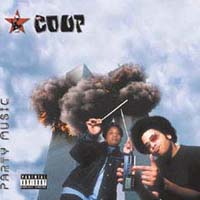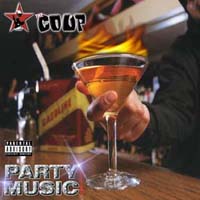|
"Even
politically, music has always served to narrate what’s
going on," says Boots Riley, the hip-hop artist and
political activist. Boots and his group, the Coup, are
one of the biggest contributors to Oakland’s hip-hop scene—probably
the most innovative place to be in hip-hop right now.
"People think they want escapism, but I think that
music that people like the most is something that deals
with their reality," he explains.
 |
 |
In light of the Coup’s
recent album, Party Music, this statement is clearly
applicable not just to the music Boots admires, but also
his own work. For as the twin towers were struck in New
York, Party Music was going to press… featuring
Boots Riley and his longtime musical partner, DJ Pam,
in front of a contrived photograph of the twin towers
exploding. As the news overtook the country, the photograph
was switched, but since the incident Boots has proudly
stood by his album, even while people made sweeping accusations
that he was contributing to terrorism or turning his back
on America’s grief. Instead, for Boots, the coincidence
has provided an opportunity to criticize the war with
a unique candor and intelligence.
"It must be said,"
he wrote in a bold statement to the press just a few days
after the event happened. "That recent atrocities
at the hands of the U.S. government and its corporate
backers each dwarf the World Trade Center catastrophe.
Atrocities like the bombing of Sudan by Bill Clinton in
which tens of thousands of civilians lost their lives,
atrocities like the bombing of thousands of civilians
in Iraq, atrocities like the deaths of thousands in Haiti
at the hands of U.S.-backed terrorist Emmanuel Constance,
atrocities like the thousands of civilians killed in their
homes in Panama by U.S. bombs, atrocities like the thousands
upon thousands massacred by U.S. backed troops in East
Timor. These atrocities were committed in the name of
corporate profit."
And while fans continued
to rally around Boots, the media approached Boots with
amazement for his calm resistance to endorse the country’s
desire for immediate revenge. "At first, I spoke
with a lot of reporters who were very angry with me for
wanting to use this unfortunate coincidence to talk about
U.S. policies and to speak out against the war,"
Boots said in a recent interview. "But we were using
the album cover as a metaphor, a symbol for the destruction
for capitalism. The reason they [the twin towers] were
on the cover of my album is the same reason the planes
crashed into them. They’re a symbol of capitalism and
the world we live in. It’s the same reason those kids
at Columbine said their end goal was to get into a plane
and crash into the twin towers."
Now, nearly five months
later, Boots maintains that those accusations made against
him—of providing a slap in the face to the victims’ families—apply
more to corporate America than to himself. "Now we
see major television networks coming out with fictional
movies about September 11th," Boots points
out. "And they’re using those images—the unfortunate
and terrible death of people—for their own political interests
and capital gain. Yet, when someone uses that image to
speak out against the war, it’s considered a travesty."
Boots, a self-professed
communist, hopes that in doing so, he can illustrate the
relationship between the terrorists who are attacking
the U.S., and America’s political zealots.
"Basically,
what I’m saying, is that acts of individual terrorism
are a trend that comes out of the right wing," he
explains. "For example, take Al Qaeda. Obviously,
these people are not a friend to the people at all. But
the reason they have power, the reason they exist, is
because of the movement, in the late ’70s, in which groups
like this were funded, by the U.S., to take control all
over The Middle East. In Afghanistan, for instance, the
Mujahideen’s Democratic Party of Afghanistan came to power.
Now, the Mujahideen weren’t the best group, but they allowed
women to dress how they wanted, they provided health care…
But the U.S. government didn’t like this group, because
they weren’t allowing oil investments to be as successful
as they liked. So the U.S. government went to the Islamic
leaders and said, ‘Look, this group isn’t holding up what
Islam is about.’ And they gave them billions of dollars
to overthrow the Mujahideen."
"It’s about money,"
Boots concludes. This belief, that wealth should be more
evenly distributed all over the world, is at the core
of all the ideas for which Boots is an advocate. "Osama
comes from a group of Saudi Arabian business men, and
for them, Islamic fundamentalism has everything in line
with Republicans. I mean, if you look at the way women
are treated, the way they believe wealth should be distributed,
and the idea of free market capitalism, they have everything
in common. Osama may put a romantic twist on it with religion,
but for him, it’s ultimately about the money."
So why would Osama bomb
the U.S., if he has everything in common with the U.S.
government? "Osama wants more control over the oil
in his area," Boots says. "He needs to get a
conflict going that makes it easier to bargain with the
U.S. It’s about oil on both sides."
Boot’s politics seem
particularly relevant at this particular moment, but his
music has, since the early ’80s, relied on this combination
of advocating for political change, and pushing hip-hop
to its creative limits. From his first album in 1993,
Kill My Landlord, to their third in 1998, Steal
This Album, Boots has maintained the basics of ’70s
funk, but updated them with contemporary scratching and
mixing. And all the while, he has been involved in political
activism both locally and nationally; he’s most famous
for his leadership in the group Young Comrades, an Oakland
based group which advocates political change.
Listening to Boots talk
is captivating, but the best thing about Boots Riley is
his music. One can feel and hear how his conviction is
channeled. His lyrics are clean and tight, his voice is
articulate, and the thrust of the music, the elegance
in his skill and that of his band, is incredibly seductive.
Perhaps even more amazing is the fact that even while
Boots’ politics are heavy with the weight of America’s
greed and tragedy, his music is inspiring, rather than
desperate. The album’s title, Party Music, is accurate,
for this is music that makes one want to relax and do
great things, rather than inflict further tragedy on America,
or seek revenge.
Even in the second song,
"5 Million Ways to Kill a CEO," the melody and
lightness suggest dancing, most of all, and beyond that,
enthusiasm for the music, the crowd, and the solidarity
between them. Which is ultimately, beyond Boots’ political
studies and criticism, what he’s all about. "I think
that art is about the artist communicating to another
person," he says. "Politically, it can validate
what people think, can bring them together with others
who feel that way. I don’t think art can be used exclusively,
without a political campaign behind it—I mean, you have
to have a movement—but everywhere I went on my recent
tour, I would speak out against the war. And everywhere,
people would come up to me and say, ‘I thought I was the
only person in my town who was against the war. And now
I see I’m wrong.’"
|